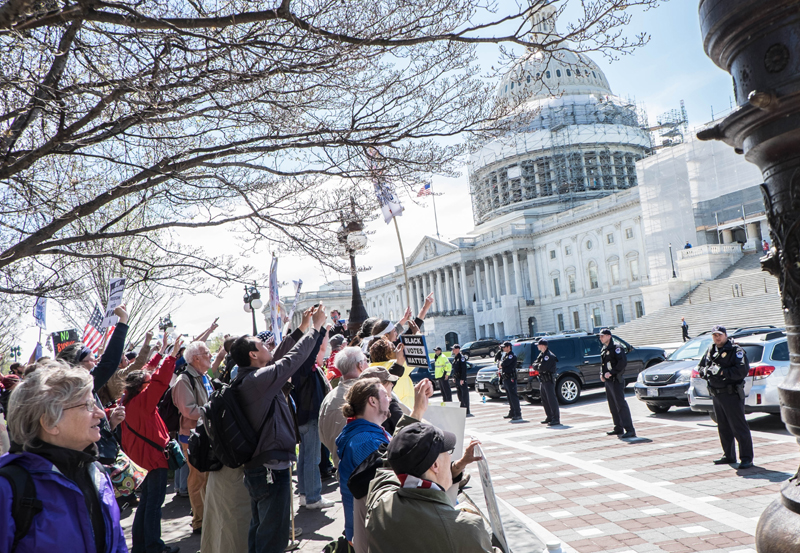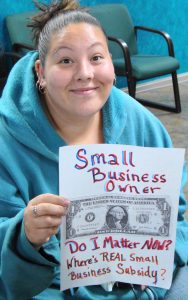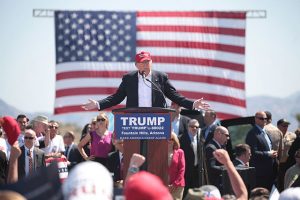If you want to build a big movement, pick a big fight

Democracy Spring protesters at the United States Capitol building, April 2016. (Michele Egan/Wikimedia)
A week before the election, I went to a Hillary Clinton rally in Cincinnati, Ohio. It was a well-attended and polite affair on the riverfront in Smale Park. That night increased my worry about her chances to win.
Clinton seemed to be playing what I’ll call “small ball.” She spoke of policy issues, like which gun control measures she wanted to enact. She spoke about the threat Donald Trump posed to national security. And she spoke about how many people he had insulted.
What worried me was the mild interest. By comparison, Donald Trump filled U.S. Bank arena in Cincinnati in October.
Michael Moore wrote:
And therein lies the problem for November – who is going to have the most motivated, most inspired voters show up to vote? You know the answer to this question. Who’s the candidate with the most rabid supporters? Whose crazed fans are going to be up at 5 AM on Election Day, kicking ass all day long, all the way until the last polling place has closed, making sure every Tom, Dick and Harry (and Bob and Joe and Billy Bob and Billy Joe and Billy Bob Joe) has cast his ballot?
Sadly, he was right. Trump even did better with minorities than Romney did in 2012.
In part, it was because he picked a big fight.
Once Clinton beat Bernie Sanders, the economy seemed to take a backseat. In this vacuum, Trump spoke to the people of the Rust Belt who’ve suffered the most over the past 30 years and gave them a message of economic hope.
Of course it was all smoke and mirrors. It was, however, the only big fight in town. Clinton bet heavily on an anti-Trump message.
If you want to build a big movement, pick a big fight.
Democracy
The situation that corporate special interest groups want is people fighting each other. They want us competing over what they decide they want to pay, not talking about what would make our country better and figuring out how to get there. They want us dispersed on many fronts. They want us fighting over issues and policy details.
There are many, many good groups in the U.S. working toward change. Add to these the thousands of churches in Ohio: the Baptists, the Catholics, the Protestants, the synagogues, the Mormons, the Lutherans, the Presbyterians, the Church of Christ, the Muslims, and the evangelical Christians.
Add to these all of the small businesses and business organizations, the local chambers of commerce, the manufacturing groups, the automotive groups, the unions, the bar associations, the architectural societies, the journalist organizations, the regional development groups, and the minority business organizations.
Add to these the philanthropic organizations like the Moose, the Elk, the Rotary clubs, the Kiwanis, the United Way, the Red Cross, all of the various neighborhood foundations. Add the groups fighting for various disease cures like the American Cancer Society, the Red Cross, the Cystic Fibrosis Foundation, and Prevent Blindness Ohio.
Add the museums, the zoos, the Boys and Girls Clubs, the scouting organizations, the YMCA, and YWCA.
The literacy councils, the Society for the Prevention of Cruelty to Animals, the libraries, the health centers, and the hundreds of arts organizations including theatre groups, orchestras, art galleries, and even puppet troupes.
At first, the list looks a bit daunting (and it’s not even scratching the surface).
There are a lot of interest groups focused around different issues and causes. It would be very easy to see all of these different groups as having different goals and agendas.
But what we all seem to share is a common belief in democracy. If these groups all decided to work together for a common cause like democracy, not only would they find they suddenly had more negotiating leverage, but they would also find it much easier to achieve their individual goals.
We would all benefit if we were a more democratic society, if we believed more in equality, if we desired a freedom that was more than consumer choice, if we restored our belief in mutual responsibility, and if our economy was working better for more people.
Values create a virtual union. Values are what unite us.
I talk about democracy and our virtual union because there is a different system being proposed. This system is the market as a form of government.
Competition in this system isn’t competition to build a better country or better world for people. It’s competition among people for lower wages and less benefits.
The vision of America that the Chamber of Commerce has is a country where people fight and compete with each other every day, in order to make a few very wealthy people wealthier.
This is why we need to resurrect these common beliefs that sometimes seem like faded, distant memories. They are our sense of common cause and common purpose.
Abraham Lincoln closed the Gettysburg Address by saying:
It is rather for us to be here dedicated to the great task remaining before us—that from these honored dead we take increased devotion to that cause for which they gave the last full measure of devotion—that we here highly resolve that these dead shall not have died in vain—that this nation, under God, shall have a new birth of freedom—and that government of the people, by the people, for the people, shall not perish from the earth.
— Abraham Lincoln, 1863.
Belief in these simple, common values supports all of the great work that all of these individual groups do on a day-to-day basis (on often extremely limited budgets).
What unites us are our values.
A different version of America is now being proposed, where people are supposed to compete against each other for ever smaller amounts in a never-ending race to the bottom.
We can acquiesce and fight along these false divides, or we can remember the principles on which our country was founded. We can remember what makes us a union.
Where to start?
I believe the answer is both easy and difficult. It’s easy because none of the steps are particularly difficult. It’s difficult because a great deal of money is being spent to encourage the politics of resignation—making participation in a democracy culturally unacceptable (You’re socialist! You’re against free markets! You’re against all that is holy and good! You’re evil! Markets will take care of everything!).
The flip side of this coin is reactionary. The flip side consists primarily of disputing the proposed Ayn Randian vision of America without offering a better vision. This looks like data. Or deconstruction. Or endless irony.
Power should be challenged. If we do nothing but challenge, however, a vacuum of vision exists that is currently being filled by the beliefs of corporate special interest groups like the U.S. Chamber of Commerce. In this past election, it was filled by the snake-oil sales pitch of “Make America Great Again.”
The good news is that a better vision exists. We just often forget about it in our haste to talk about policies or the cause we support. Or we take this vision for granted, thinking everyone already shares our beliefs. In fact, it’s really more about resurrecting a vision rather than creating anything new.
This vision is of democracy. This vision is of a freedom that goes beyond consumer choice. This vision is of a people who care about each other as well as themselves. This vision is equality and an economy that works for the benefit of everyone, not just a few.
We need a new movement for democracy. A movement that recognizes that this is what is at risk in our country, and a movement that sets the goal at restoring democracy.
The way to move the needle in the direction of “we, the people,” is to shift the landscape, support the best representatives we have, and work to elect ever better representatives to fight for our values.
If the landscape shifts, politicians from both parties will follow.
We have a better vision: a vision of a country united for the good of the people. To make this vision reality, we simply need to recognize it, vote it, grow support for it, get our representatives to act on it, and teach it. If enough people fight for this vision, it won’t matter what corporate special interest groups want.
All things used to be possible in America, including the moon. This is why I believe that we’re not thinking big enough. We’re fighting over the crumbs. We’re battling over small tactical issues and policies. We’re fighting for bits and pieces here and there.
If we can restore big visionary ideas like democracy, then passing specific policies and legislation becomes much easier.
If we want to build a big movement, we need to pick a big fight.
Excerpted from The Little Book of Revolution: A Distributive Strategy for Democracy (ebook now available). Cross posted at Daily Kos.












